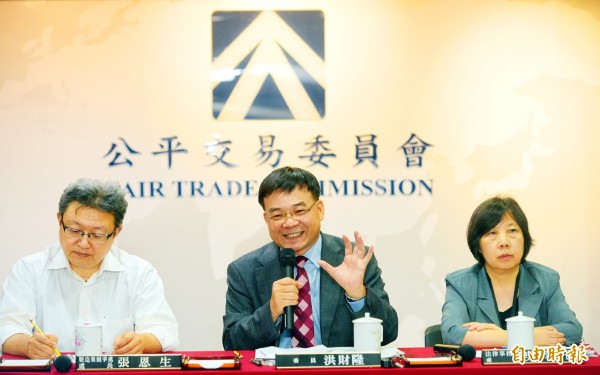《TAIPEI TIMES》 FTC settles Qualcomm anti-trust suit

Fair Trade Commission commissioner Hong Tsai-lung, center, speaks at a news conference in Taipei yesterday flanked by Department of Manufacturing Industry Competition Director Chang En-sheng, left, and Department of Legal Affairs Director Wu Tsui-feng. Photo: Chang Chia-ming, Taipei Times
PUBLIC INTEREST: The commission said that the firm has agreed to renegotiate patent license contracts and that its support of commercial initiatives would benefit the nation
By Lisa Wang / Staff reporter
The Fair Trade Commission (FTC) yesterday said it has settled an anti-trust lawsuit with Qualcomm Inc after the world’s largest mobile phone chip supplier agreed to invest US$700 million to deepen its technological partnerships in Taiwan, especially in 5G communication networks and artificial intelligence.
The settlement was a massive twist, as the commission in October last year slapped Qualcomm with a record-high fine of NT$23.4 billion (US$762 million at the current exchange rate) aimed at improving market competition and safeguarding the interests of the local supply chains of chipmakers, original design manufacturing service providers and mobile phone vendors.
Based on the settlement, the San Diego, California-based chipmaker is no longer required to pay the remainder of the fine, having paid NT$2.73 billion as of last month.
Instead, Qualcomm is to allocate US$700 million to scale up its collaboration with local enterprises and government agencies over the next five years.
“The settlement aims to best serve the interests of the public,” FTC Commissioner Hong Tsai-lung (洪財隆), who was in charge of the Qualcomm case, told a media briefing.
The chipmaker has addressed the commission’s concerns about hampering market competition, as it has agreed to renegotiate patent licensing contracts with Taiwanese firms on a fairer and friendlier basis, he said.
No royalty price adjustments were included in the settlement, he added, which is unlike the results of anti-trust cases against Qualcomm in China and South Korea.
“FTC commissioners decided to settle the litigation due to multiple factors,” Hong said, adding that the original penalty was disputable and the settlement took into consideration Taiwan’s industrial development.
Qualcomm is to drive commercial initiatives — including collaboration on 5G, new market expansion, collaboration with start-ups and universities and the development of a Taiwanese center for operations and manufacturing engineering — to benefit the mobile and semiconductor ecosystem, small and medium-sized enterprises and consumers, the commission said.
“Qualcomm, a 4G technology leader, is to play a leading role in the 5G era as well. With Qualcomm’s technological support, Taiwanese companies will be able to accelerate their new 5G-enabled product development to reduce their time to market,” Ministry of Economic Affairs Department of Industrial Technology Director General Lo Ta-sheng (羅達生) told reporters.
The department and other government agencies, including the Ministry of Science and Technology and the Industrial Technology Research Institute (ITRI), are to discuss details of the collaboration programs later, Lo said.
All 5G projects would be new, as Qualcomm had terminated a project with the ITRI to develop and supply 5G chips for small-cell base stations to focus on core processors, the department said.
Separately yesterday, MediaTek Inc (聯發科), which competes with Qualcomm in supplying chips to Chinese handset vendors, expressed dissatisfaction with the commission’s decision to settle the case.
“[MediaTek] cannot agree with the FTC’s decision to settle the case and entirely scrap the penalty,” the firm said in a filing with the Taiwan Stock Exchange. “The commission has fallen short in its role of safeguarding market competition.”
The commission failed to request that Qualcomm adjust its licensing fees and its controversial approach of charging royalties per unit, MediaTek said.
The settlement would jeopardize Taiwanese companies’ competitiveness in the 5G era, it said.
新聞來源:TAIPEI TIMES



















